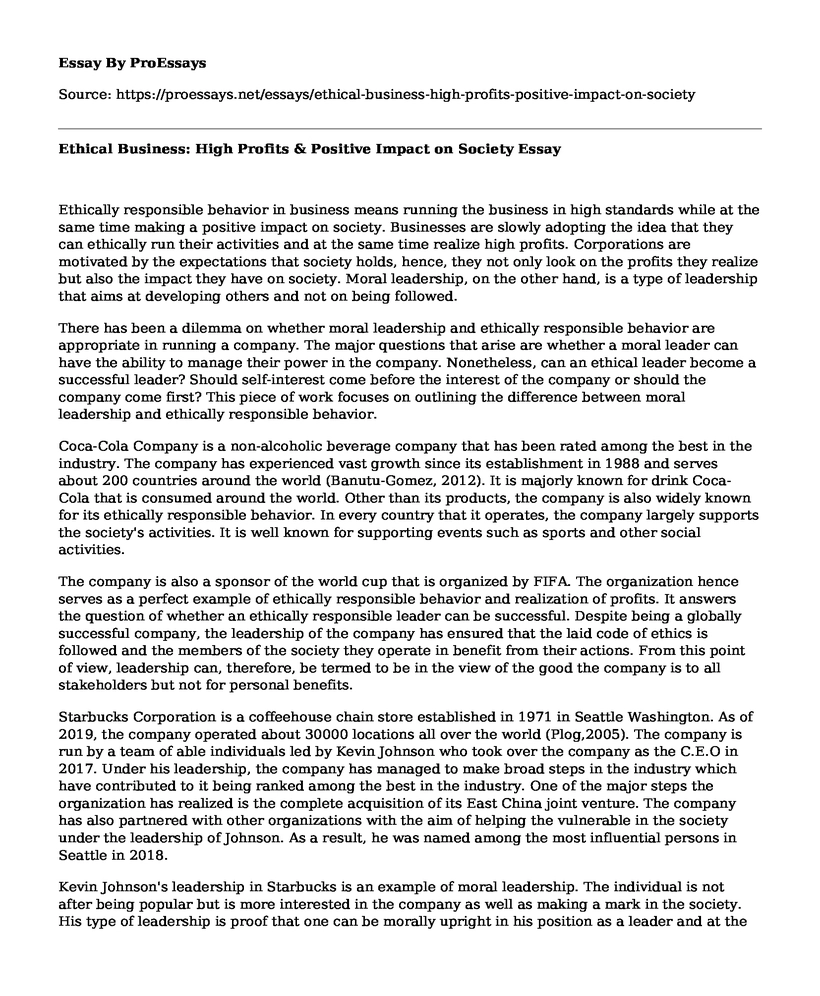Ethically responsible behavior in business means running the business in high standards while at the same time making a positive impact on society. Businesses are slowly adopting the idea that they can ethically run their activities and at the same time realize high profits. Corporations are motivated by the expectations that society holds, hence, they not only look on the profits they realize but also the impact they have on society. Moral leadership, on the other hand, is a type of leadership that aims at developing others and not on being followed.
There has been a dilemma on whether moral leadership and ethically responsible behavior are appropriate in running a company. The major questions that arise are whether a moral leader can have the ability to manage their power in the company. Nonetheless, can an ethical leader become a successful leader? Should self-interest come before the interest of the company or should the company come first? This piece of work focuses on outlining the difference between moral leadership and ethically responsible behavior.
Coca-Cola Company is a non-alcoholic beverage company that has been rated among the best in the industry. The company has experienced vast growth since its establishment in 1988 and serves about 200 countries around the world (Banutu-Gomez, 2012). It is majorly known for drink Coca-Cola that is consumed around the world. Other than its products, the company is also widely known for its ethically responsible behavior. In every country that it operates, the company largely supports the society's activities. It is well known for supporting events such as sports and other social activities.
The company is also a sponsor of the world cup that is organized by FIFA. The organization hence serves as a perfect example of ethically responsible behavior and realization of profits. It answers the question of whether an ethically responsible leader can be successful. Despite being a globally successful company, the leadership of the company has ensured that the laid code of ethics is followed and the members of the society they operate in benefit from their actions. From this point of view, leadership can, therefore, be termed to be in the view of the good the company is to all stakeholders but not for personal benefits.
Starbucks Corporation is a coffeehouse chain store established in 1971 in Seattle Washington. As of 2019, the company operated about 30000 locations all over the world (Plog,2005). The company is run by a team of able individuals led by Kevin Johnson who took over the company as the C.E.O in 2017. Under his leadership, the company has managed to make broad steps in the industry which have contributed to it being ranked among the best in the industry. One of the major steps the organization has realized is the complete acquisition of its East China joint venture. The company has also partnered with other organizations with the aim of helping the vulnerable in the society under the leadership of Johnson. As a result, he was named among the most influential persons in Seattle in 2018.
Kevin Johnson's leadership in Starbucks is an example of moral leadership. The individual is not after being popular but is more interested in the company as well as making a mark in the society. His type of leadership is proof that one can be morally upright in his position as a leader and at the same time make an impact in the society as well as ensure the business achieves the set goals.
From the illustrations above, moral leadership and ethically responsible behavior are different in context. The similarity, however, comes in that they contribute to the development of the society that the business operates as well as build the brand.
References
Banutu-Gomez, M. B. (2012). Coca-Cola: International business strategy for globalization. The Business & Management Review, 3(1), 155.Retrieved from https://pdfs.semanticscholar.org/6e16/e847831833ae83f483df808db4eb74041d06.pdfDantley, M. E. (2005). Moral leadership. The sage handbook of educational leadership, 34-46.Retrieved from ME Dantley - The sage handbook of educational leadership, 2005 - books.google.com
Gini, A. (1997). Moral leadership and business ethics. Journal of Leadership Studies, 4(4), 64-81.Retrieved from https://journals.sagepub.com/doi/abs/10.1177/107179199700400406Plog, S. C. (2005). Starbucks: More than a cup of coffee. Cornell Hotel and Restaurant Administration Quarterly, 46(2), 284-287. Retrived from https://journals.sagepub.com/doi/abs/10.1177/0010880405275535
Cite this page
Ethical Business: High Profits & Positive Impact on Society. (2023, Mar 26). Retrieved from https://proessays.net/essays/ethical-business-high-profits-positive-impact-on-society
If you are the original author of this essay and no longer wish to have it published on the ProEssays website, please click below to request its removal:
- Individual Critical Reflection Paper on a Pregnant Woman
- Communicating Effectively Assessment Annotated Bibliography
- Essay Example on Medical University Improves Life Expectancy of Rural Areas
- Medical Malpractice: 10,000+ Suits Annually in US Despite Regulation - Essay Sample
- Essay Example on Plant-Based Diets: A Growing Trend for Better Health and Wellbeing
- Essay on Parents Apprehended for Refusing Hospital: Madeline Neumann's Tragic Story
- Chronic Kidney Disease: Impact on US Patients & Society - Essay Sample







